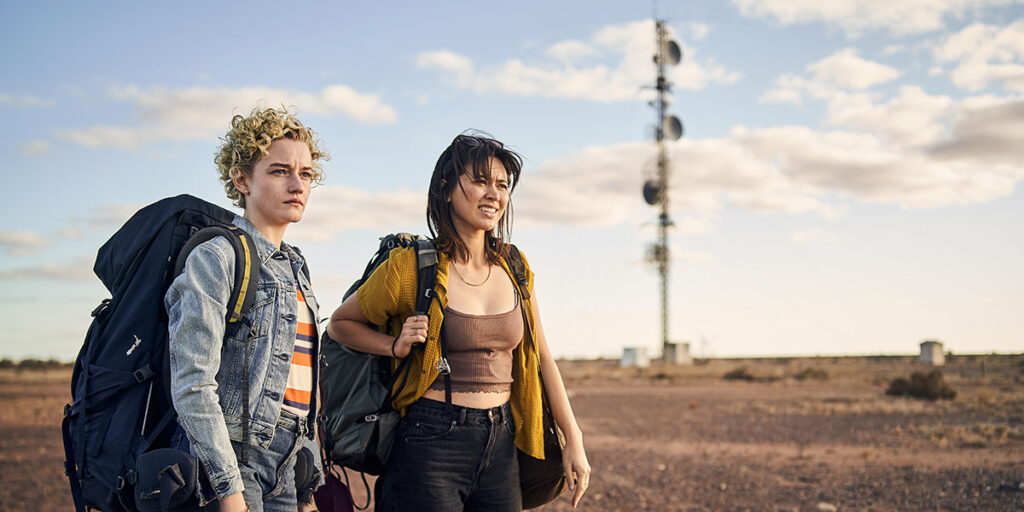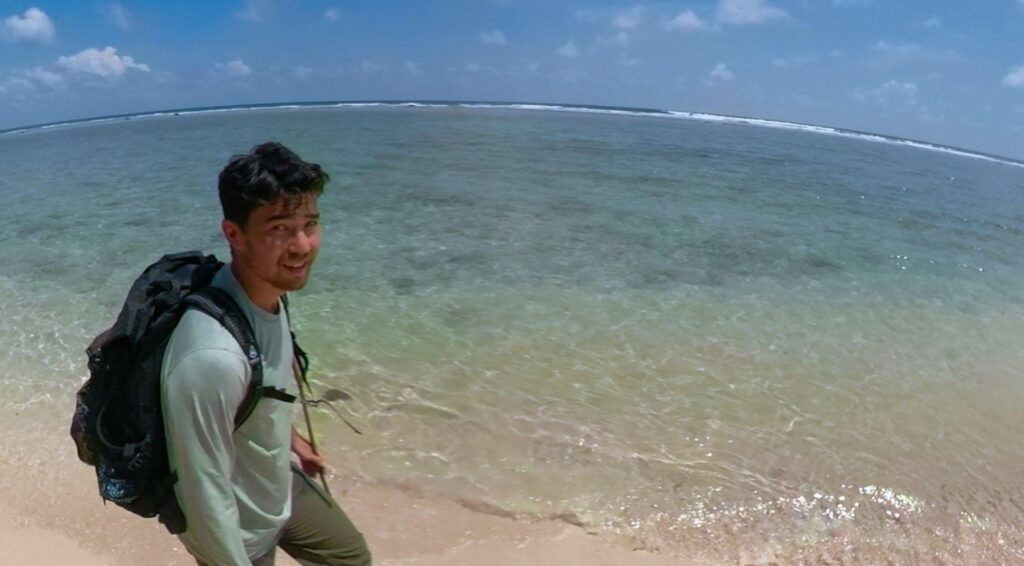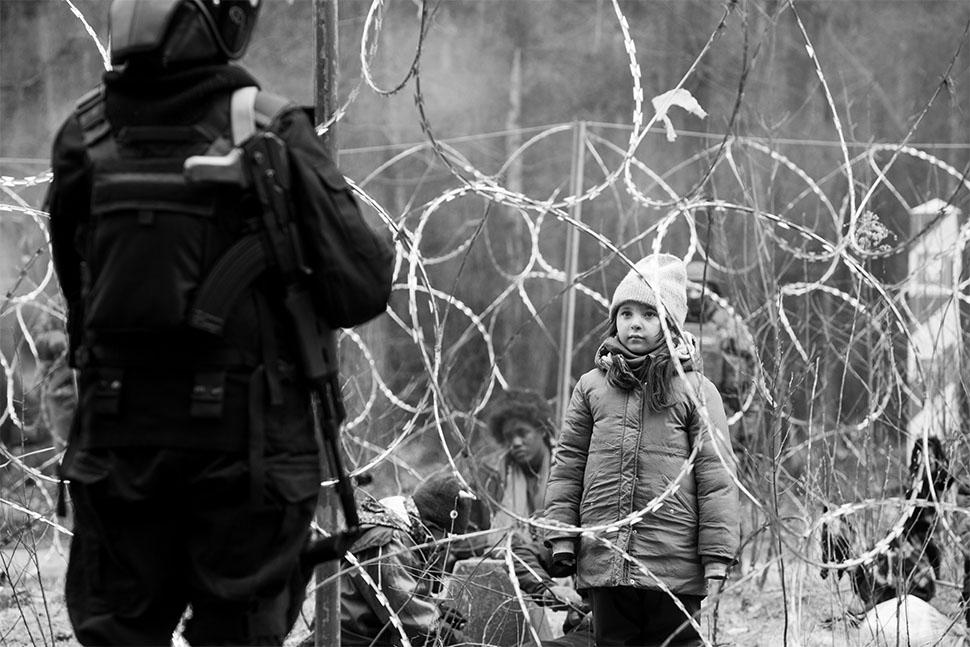Feelin’ Film is thrilled to be covering the Vancouver International Film Festival for the first time! This page will serve as a running journal, where you can read my thoughts on the films I see as the festival progresses. These early reactions will later be accompanied by more robust podcast reviews. For now, enjoy following along with my journey, see if anything sparks your interest, and be sure to let me know if it does. Thanks for reading. – Aaron White
- Note: Reviews published in order of most recently seen on top.
THE ROYAL HOTEL (dir. Kitty Green)

Rating:
Kitty Green is a master at creating subtle, ever-present tension in what feels like mundane situations. This time around, two young women traveling around Australia have run out of money and choose to take a service job at a bar in a remote outback mining town. From the moment they sign up, where they’re warned that it’s going to be a bit rough and misogynistic, Hanna and Liv are faced with escalating incidents that test their willpower.
For almost the entire runtime, this is a pressure cooker, where our real life understanding of the dangers women face in this world keeps us on edge because of what we see. We’re waiting for the shoe to drop at any moment and turn this into a horrific moment that goes beyond verbal abuse and sexual harassment into something these girls can’t come back from. The exploration of gender power dynamics is every bit as engaging and scathing as it Green’s previous film, THE ASSISTANT, and an added layer of two women approaching their situation from different perspectives. They may be friends, but Liv likes to push the limits in pursuit of having fun while Hanna is much more reserved and careful. With Liv, we are constantly wondering just how far she’s willing to go in order to keep the peace. And with Hanna, we’re just wondering when she’s going to reach her breaking point and explode.
As a man, I kept wishing that someone like me would step in and support them. I can’t even imagine how tough and potentially triggering this might be for women to watch, and once again the realization that this is what most if not all experience at times in their lives was deeply troubling. Some have said that the film leans into horror but I think it stays very strictly in thriller territory, never quite going beyond what is plausible.
One thing that is probably controversial to even say is that I also couldn’t stop thinking about the decision-making process. Yes, the primary issue here is the vile behavior and expectations of men. But I hope that this can be seen as a cautionary tale, as well. This is unfortunately the world we live in and sometimes people have to take steps to protect themselves. Reading the signs and getting out of a scary situation before it’s too late is paramount. I’ve also never understood the kind of bar lifestyle that we see here. Alcohol may not make people into assholes, but it certainly brings out the worst traits in full force. Anyway, this is probably better served as part of a more nuanced conversation, but it was something I couldn’t help but think about the whole time. To be clear, nothing that happens is the girls’ fault – but I do think it’s fair to question how far they let it go.
This is a great film and I am buying all the stock in Kitty Green, Julia Garner, and Jessica Henwick. Oh, and this movie definitely is a contender for the best final line of dialogue/scene of the year, which provides a much needed moment chuckle and moment to finally breathe.
THE MISSION (dir. Jesse Moss and Amanda McBaine)

Rating:
This is just fantastic documentary filmmaking, plain and simple. Moss and McBaine take a subject that most people have already completely prejudged based on a headline or meme and take the time to allow an audience to get to know the man behind a fatal decision to illegally attempt a solo mission trip on a remote indigenous island. It uses actors reading journal entries and letters from John and his family as well as a slew of insightful interviews and also features some beautiful animated reenactment sequences throughout.
The film is structured with a couple of major frameworks that I really appreciated – one being John Chau’s love of adventure stories and how those have influenced people through the ages to force themselves and their beliefs onto people who have no desire to welcome the modern world, and the other being the reckoning of John’s father with his son’s religious zealotry and justification and the radical evangelistic culture that encouraged his actions.
The filmmakers do a great job of not taking a side. We get to know John as the passionate person he was through family and friend interviews, but we also learn about the affects of his impending mission and historical context from anthropologists and people who’ve experienced it first hand. They deftly show us that <i>”fine line between madness and faith”</i> in a way that invites reflection, contemplation, and hopefully conversation about the way that people on both sides of this issue feel.
I don’t think their goal was ever to take a side, but rather to help us understand the world we live in and the forces that can motivate people to do seemingly inexplicable things. In my opinion, two things can be true – John’s death was a horrible preventable tragedy and his choice to ignore the clear wishes of the Sentinelese was a dangerous, selfish decision by a man whose faith blinded him to reality.
GREEN BORDER (dir. Agnieszka Holland)

Rating:
Director Agnieszka Holland bravely defies the current political powers in her home country by dramatically showcasing the migrant crisis that exists among the forested border area between Poland and Belarus. The sprawling film follows a refugee group from Syria as they attempt to seek asylum in Poland, having been promised easy passage into the EU and used as geopolitical pawns like so many others by Belarusian dictator Alexander Lukashenko. Along the way their story intertwines with that of an activist who is doing her best to bring attention to the inhumane treatment of the refugees at the risk of her own life and a border guard who questions and is disturbed by the unethical practices of his brainwashed colleagues. Their storylines are easy to latch onto because we want to believe that people like them exist and could eventually turn the tide. This is not an easy watch, but it is an essential one. Holland unflinchingly shows the ping pong border game in its full brutal nature. Human rights atrocities abound on both sides of the razor wire including beatings, starvation, torture, sexual assault, and a general refusal to help which leads to death. Though it does feature fantastic performances and the stark black and white photography looks incredible while accentuating the dour situation, the crisis as we’re shown feels grim and there seems to be no real hope in sight, and that is why this is critical filmmaking that goes beyond entertainment.

